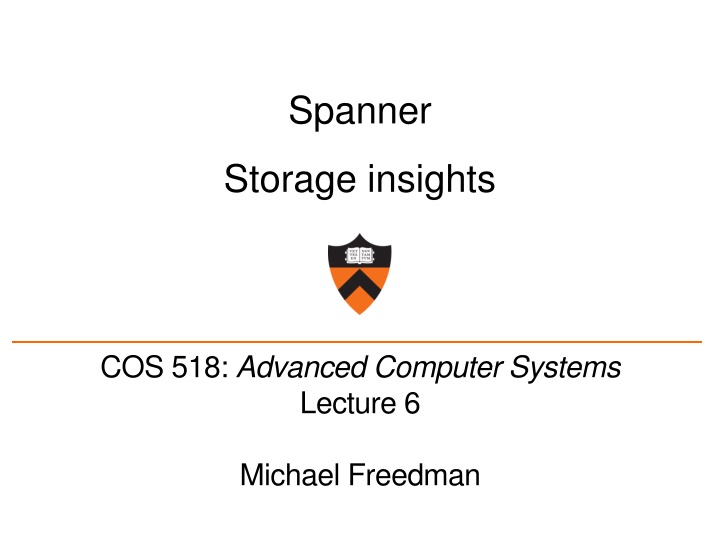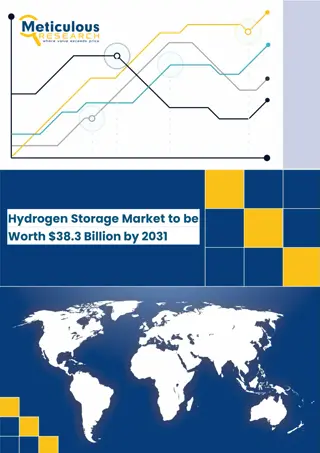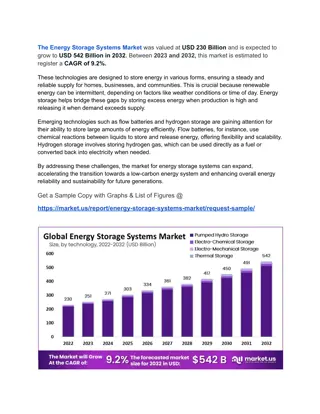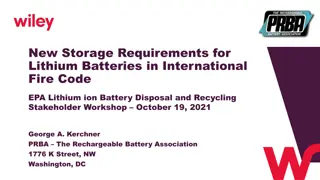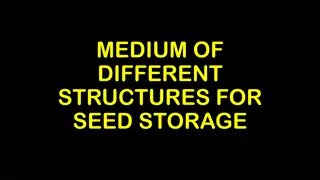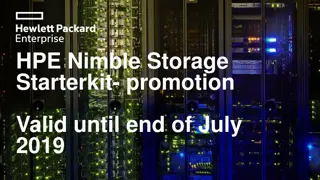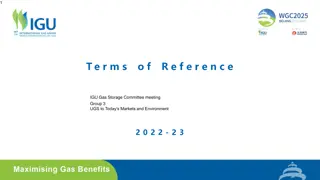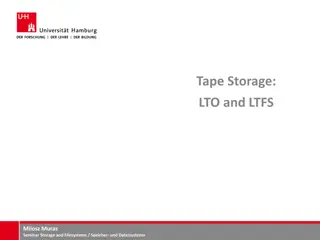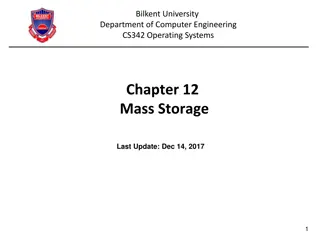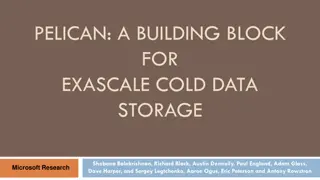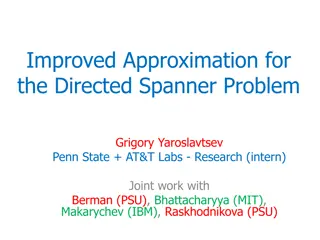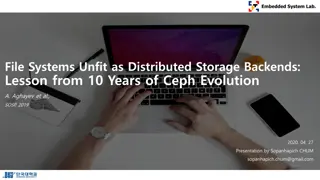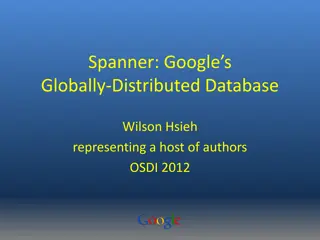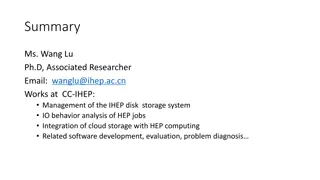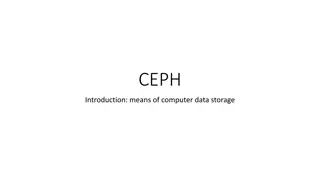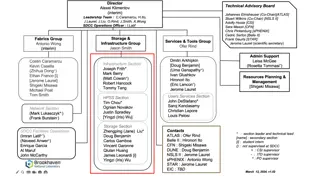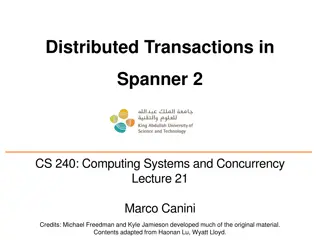Spanner Storage insights
In this lecture, Michael Freedman discusses advanced computer systems topics like strict serialization with 2PL & OCC, multi-version concurrency control, MVCC intuition, serializability vs. snapshot isolation, and distributed transactions. The content covers the key concepts and mechanisms used in modern database systems to ensure data consistency, concurrency control, and distributed transactions effectively.
Download Presentation

Please find below an Image/Link to download the presentation.
The content on the website is provided AS IS for your information and personal use only. It may not be sold, licensed, or shared on other websites without obtaining consent from the author.If you encounter any issues during the download, it is possible that the publisher has removed the file from their server.
You are allowed to download the files provided on this website for personal or commercial use, subject to the condition that they are used lawfully. All files are the property of their respective owners.
The content on the website is provided AS IS for your information and personal use only. It may not be sold, licensed, or shared on other websites without obtaining consent from the author.
E N D
Presentation Transcript
Spanner Storage insights COS 518: Advanced Computer Systems Lecture 6 Michael Freedman
2PL & OCC = strict serialization Provides semantics as if only one transaction was running on DB at time, in serial order + Real-time guarantees 2PL: Pessimistically get all the locks first OCC: Optimistically create copies, but then recheck all read + written items before commit 2
Multi-version concurrency control Generalize use of multiple versions of objects 3
Multi-version concurrency control Maintain multiple versions of objects, each with own timestamp. Allocate correct version to reads. Prior example of MVCC: 4
Multi-version concurrency control Maintain multiple versions of objects, each with own timestamp. Allocate correct version to reads. Unlike 2PL/OCC, reads never rejected Occasionally run garbage collection to clean up 5
MVCC Intuition Split transaction into read set and write set All reads execute as if one snapshot All writes execute as if one later snapshot Yields snapshot isolation < serializability 6
Serializability vs. Snapshot isolation Intuition: Bag of marbles: white, black Transactions: T1: Change all white marbles to black marbles T2: Change all black marbles to white marbles Serializability (2PL, OCC) T1 T2 or T2 T1 In either case, bag is either ALL white or ALL black Snapshot isolation (MVCC) T1 T2 or T2 T1 or T1 || T2 Bag is ALL white, ALL black, or white black 7
Consider partitioned data over servers R L U O L R W U P L W U Q Why not just use 2PL? Grab locks over entire read and write set Perform writes Release locks (at commit time) 19
Consider partitioned data over servers R L U O L R W U P L W U Q How do you get serializability? On single machine, single COMMIT op in the WAL In distributed setting, assign global timestamp to txn (at sometime after lock acquisition and before commit) Centralized txn manager Distributed consensus on timestamp (not all ops) 20
Strawman: Consensus per txn group? R L U O L R W U P L W U Q R S Single Lamport clock, consensus per group? Linearizability composes! But doesn t solve concurrent, non-overlapping txn problem 21
Spanner: Googles Globally- Distributed Database OSDI 2012 22
Googles Setting Dozens of zones (datacenters) Per zone, 100-1000s of servers Per server, 100-1000 partitions (tablets) Every tablet replicated for fault-tolerance (e.g., 5x) 23
Scale-out vs. fault tolerance O OO P PP QQQ Every tablet replicated via Paxos (with leader election) So every operation within transactions across tablets actually a replicated operation within Paxos RSM Paxos groups can stretch across datacenters! (COPS took same approach within datacenter) 24
Disruptive idea: Do clocks really need to be arbitrarily unsynchronized? Can you engineer some max divergence? 25
TrueTime Global wall-clock time with bounded uncertainty TT.now() time earliest latest 2* Consider event enow which invoked tt = TT.new(): Guarantee: tt.earliest <= tabs(enow) <= tt.latest 26
Timestamps and TrueTime Acquired locks Release locks T Pick s > TT.now().latest s Wait until TT.now().earliest > s Commit wait average average 27
Commit Wait and Replication Start Achieve consensus Notify followers consensus Acquired locks Release locks T Pick s Commit wait done 28
Client-driven transactions Client: 1. Issues reads to leader of each tablet group, which acquires read locks and returns most recent data 2. Locally performs writes 3. Chooses coordinator from set of leaders, initiates commit 4. Sends commit message to each leader, include identify of coordinator and buffered writes 5. Waits for commit from coordinator 29
Commit Wait and 2-Phase Commit On commit msg from client, leaders acquire local write locks If non-coordinator: Choose prepare ts > previous local timestamps Log prepare record through Paxos Notify coordinator of prepare timestamp If coordinator: Wait until hear from other participants Choose commit timestamp >= prepare ts, > local ts Logs commit record through Paxos Wait commit-wait period Sends commit timestamp to replicas, other leaders, client All apply at commit timestamp and release locks 30
Commit Wait and 2-Phase Commit Start logging Done logging Acquired locks Release locks TC Committed Notify participants sc Acquired locks Release locks TP1 Release locks Acquired locks TP2 Prepared Send sp Compute sp for each Commit wait done Compute overall sc 31
Example Remove X from friend list Risky post P TC T2 sp= 6 sc= 8 s = 15 Remove myself from X s friend list TP sp= 8 sc= 8 Time <8 8 15 [X] [] My friends My posts X s friends [P] [me] [] 32
Read-only optimizations Given global timestamp, can implement read-only transactions lock-free (snapshot isolation) Step 1: Choose timestamp sread = TT.now.latest() Step 2: Snapshot read (at sread) to each tablet Can be served by any up-to-date replica 33
Disruptive idea: Do clocks really need to be arbitrarily unsynchronized? Can you engineer some max divergence? 34
TrueTime Architecture GPS GPS GPS timemaster timemaster timemaster GPS Atomic-clock timemaster GPS timemaster timemaster Client Datacenter 1 Datacenter 2 Datacenter n Compute reference [earliest, latest] = now 35
TrueTime implementation now = reference now + local-clock offset = reference = 1ms + worst-case local-clock drift + 200 s/sec +6ms time 0sec 30sec 60sec 90sec What about faulty clocks? Bad CPUs 6x more likely in 1 year of empirical data 36
Known unknowns > unknown unknowns Rethink algorithms to reason about uncertainty 37
The case for log storage: Hardware tech affecting software design 38
Latency Numbers Every Programmer Should Know June 7, 2012 From https://gist.github.com/jboner/2841832 See also https://people.eecs.berkeley.edu/~rcs/research/interactive_latency.html 39
~2016 Seagate ($50) 1TB HDD 7200RPM Model: STD1000DM003-1SB10C Operation Sequential Read Sequential Write Random Read 4KiB HDD Performance 176 MB/s 190 MB/s 0.495 MB/s 121 IOPS 0.919 MB/s 224 IOPS Random Write 4KiB DQ Random Read 4KiB 1.198 MB/s 292 IOPS 0.929 MB/s 227 IOPS DQ Random Write 4KiB http://www.tomshardware.com/answers/id-3201572/good-normal-read-write-speed-hdd.html 40
~2016 Seagate ($50) 1TB HDD 7200RPM Model: STD1000DM003-1SB10C Samsung ($330) 512 GB 960 Pro NVMe PCIe M.2 Model: MZ-V6P512BW Operation Sequential Read Sequential Write Random Read 4KiB HDD Performance SSD Performance 176 MB/s 190 MB/s 0.495 MB/s 121 IOPS 0.919 MB/s 224 IOPS 2268 MB/s 1696 MB/s 44.9 MB/s 10,962 IOPS 151 MB/s 36,865 IOPS Random Write 4KiB DQ Random Read 4KiB 1.198 MB/s 292 IOPS 0.929 MB/s 227 IOPS 348 MB/s 84961 IOPS 399 MB/s 97,412 IOPS DQ Random Write 4KiB http://www.tomshardware.com/answers/id-3201572/good-normal-read-write-speed-hdd.html http://ssd.userbenchmark.com/SpeedTest/182182/Samsung-SSD-960-PRO-512GB 41
Idea: Traditionally disks laid out with spatial locality due to cost of seeks Observation: main memory getting bigger most reads from memory Implication: Disk workloads now write-heavy avoid seeks write log New problem: Many seeks to read, need to occasionally defragment New tech solution: SSDs seeks cheap, erase blocks change defrag 42
